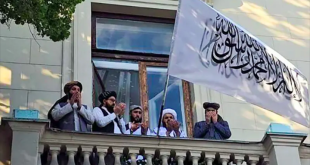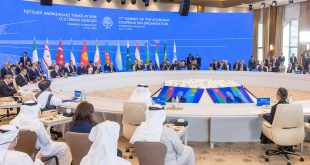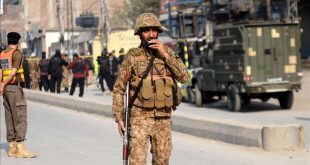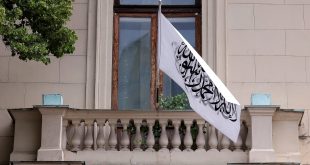AT News
KABUL: The start of direct negotiations between the Kabul peace negotiators and the Taliban team is very much necessary in the course of fragile political situation and continuation of deadly war across the country. Continuation of violence and bloodshed that badly harmed the country’s security and national stability has brought the peace process to a plateau.
Dr. Abdul Baqi Amin, peace advocate and General Director of Qased Strategic Research Center and director of the Scientific Council of the Ministry of Education, in an interview with Afghanistan Times had painted a gloomy picture of Afghanistan, saying the country’s political stability is in very much danger.
It’s in deadlock from all directions—the cabinet is still not completed, peace team is still at odds while there is a big chance existing for peace, Mr. Amin lamented.
Miseries are surrounding the pace process—deputies for High Council for National Reconciliation are yet to be appointed, Amin said. “If the barriers are removed and the current stalemate to be taken out, still Kabul has no preparations to carry the talks” he said.
Another crisis is at the bend if the government did not mend its way, and the US administration that seemingly has lost its trust on the Afghan government – is looking for an alternative, Mr. Amin said. “If the things persist, it could result in another crisis.”
He also lambasted the government for puny governing in urban areas with the security situation has completely deteriorated. “Robbery, target killings are pervasive and the government has completely failed to contain the precarious—the government’s control beyond the urban areas is very weak—and almost zero in rural areas.”
Indeed, corruption is all over, Mr. Amin said. “Key posts within the government are not hiring based on meritocracy and proficiency, and it has been depreciated due to power division between two electoral groups.”
“The ordinary Afghans have lost trust on the capability and honesty of the government.”
The biggest corruption scandal emerged during the coronavirus pandemic, in which the assistance has been misused, he said.
Furthermore, the National Dastar-Khan Program (DM) was rejected by parliament, because it was paving the way for further corruption. “The government would have more problems in delivering services to the masses in the future in different sectors,” Mr. Amin said.
Persisting corruption and the current fragility can increase people’s problem in the coming five years. “There would be more joblessness and insecurity will further increase, that’s why Afghanistan is in urgent need of a competent government,” Mr. Amin said.
According to him, the US, European Union, Russia, China and the regional countries such as Iran, Saudi Arabia, Pakistan and India, are those countries who are trying to have influence in Afghanistan.
“These countries are in antagonism within itself and countering each other’s influence in Afghanistan—Russia and China are against the US—and Iran has enmity with Saudi Arabia—and Pakistan is against India,” Mr. Amin said.
All these countries are trying to pursue their “own interests” through various means such as economic assistance, intelligence presence and supporting some political parties. “They also keep playing a role even in the presidential and parliamentary elections to make certain groups winner to work for their interest.”
Unfortunately, the intelligence agency is not that much capable to stop harmful influence and interferences of these countries in the country, Mr. Amin added.
Obviously, the Afghans have faith in election, and based on Islamic teaching and modern views, the leader of a country must be appointed through votes. “However, the Afghans can’t cast their votes to their favorite candidates due to fraud that even some individuals are selling their votes,” he said. Democracy has badly harmed and to be more clear – it no longer subsists due to foreign countries interferences into internal affairs of the country.
Prisoner release process is the biggest obstacle on the path toward the start of intra-Afghan talks, Mr. Amin said. The government has the right not to set free Taliban prisoners because it was not part of the agreement. “The process was agreed in the US-Taliban peace deal, and the Afghan government was not part of it utterly.”
Another problem is that the Taliban says not to sit in talks with the government peace team, rather to meet them in personnel capacity alongside several political parties.
“I think the Taliban wants an interim government to be formed in a bid to pave the way for holding elections, and in that case the Taliban would agree to participate in the election,” he added.
According to Amin, the Taliban are not hell-bent on obtaining full power, and they are ready for power sharing through formation of a new government.
“Taliban claims of having control over 50 percent territory and in that scenario, they at least want 50 percent power.”
Taliban favoring merit-based appointments, Mr. Amin added, saying, “I think Taliban will try to absorb security ministries—defense, interior, and intelligence agency.”
If the peace process fails, war would be intensified. “One group may fight to seize more areas, and the other group says fighting to defend their people and territory, and all warring sides would try to justify their war.”
Note: Afghanistan Times conducted the interview with Dr. Abdul Baqi Amin before his assassination in Kabul. Mr. Amin was killed in a bomb blast placed in his car on August 19.
 Afghanistan Times
Afghanistan Times




